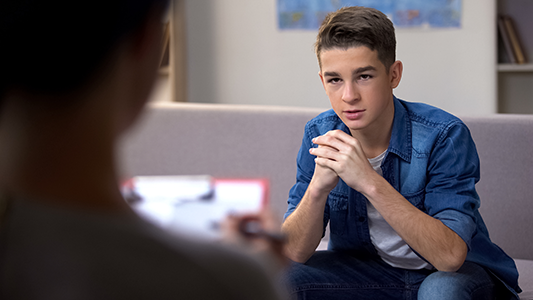|
There are 4 typical misconceptions about family therapy: 1. Family therapy takes a long time. Medicating children or teens for their problems is much quicker. 2. Family therapists blame parents for their children's problems. 3. Family therapy means that the whole family will have to be present at every session. 4. Family therapy is ineffective. Here are facts that will set these misconceptions straight. Many people, when they hear the word "therapy," get a mental image of a Woody Allen-type character spending countless years on a therapist's couch with little or no improvement in his original problem. When parents hear "family therapy," they think it will take years to complete. This is the first misconception about family therapy. From its very beginnings, family therapy has typically been "brief therapy." This is what attracts many therapists to work with families in the first place. Master family therapist Jay Haley says, “the average number of sessions required to resolve a child's problem is seven.” Family therapy is not traditional individual therapy, which can take a longer amount of time. Many parents believe that a family therapist is going to blame them for their child's problem. Why else would the therapist want to include parents in their child's therapy? Parents already feel terrible because their child is unhappy or struggling at school. They don't want to feel even worse by having a therapist point the finger at them or label them "dysfunctional." No wonder parents want to head for the hills when they think about calling a family therapist. This is the second misconception about family therapy. One of the most basic notions in family therapy is the concept of joining. "Joining" means that the therapist respects and listens carefully to each and every member of the family. The therapist may ask parents to change certain aspects of their parenting, such as being consistent about rules and consequences.  We may recommend that parents alter particular aspects of their communication with one another, such as not arguing or yelling in front of their child. We may recommend that they give their child more choices about food, clothing, etc. or limit their child's time on electronic screens. But family therapists are very aware that we must have a good relationship not only with the child in treatment but with the child's parents in order to be effective. Family therapists work collaboratively with parents as a team. Most people think that family therapy means having the entire family in the room for every session. The very thought of this would present most parents with a scheduling nightmare. In today's world, it's difficult enough to get the whole family to sit down at the dinner table once a week much less get them all in a therapist's office at the same time. This is the third misconception about family therapy. Although some early family therapists, like Virginia Satir and Mara Selvini Palazzoli, typically preferred to have the entire family in family therapy sessions, not all therapists usually work that way. Typically, therapists start out by seeing both parents together with their child in the first session and work with the parents alone after that. Sometimes they work only with the parents and never see the child at all. In the case of a teenager, they might see a mother and daughter, or a father and son, or a teenager with a sibling. When an older child or teenager has a particular kind of struggle such as anxiety, panic attacks, or difficulties with friends, I might see the teen alone for a few sessions. Family therapists are flexible and work in whatever way makes sense with each individual family to solve the problem quickly and effectively. Some parents have found in their own experience that therapy is ineffective. Years of talking about their feelings in a therapist's office did not help their depression or their anxiety or panic attacks. They finally started to feel better only after taking anti-depressants or anti-anxiety medication. Since therapy was not effective with their own problems, why would therapy help their child more than medication? This is the fourth misconception about family therapy.  Family therapy is quite different from individual talk therapy. The family therapist works with the awareness that each human being is not merely an individual, but is also a part of many social groups or social systems. A child's behavior is influenced by the people in his social groups: most importantly, his parents and siblings. Other important people in the child's social environment are teachers and friends. Family therapists do not, of course, deny the importance of a child's temperament. Some kids are more energetic than others from the time they are born. Others are more shy and sensitive. It is just a question of where in the system we focus in order to achieve the fastest change. Rather than looking for the sources of a problem within the child's individual psyche or in the chemistry of the child's brain (unless there is a true neurological disorder such as epilepsy), the family therapist looks at the child's social context. A child can be worried and distracted because her father has been laid off from his job. A boy can hit and kick other children because he overhears his parents having loud arguments and he fears that his parents are going to divorce. A girl can be failing at school because her brother is failing in life. To most people, these events may seem disconnected. But to a family therapist, they are interwoven with invisible threads. By making carefully targeted changes in the child's social context, the family therapist can be very effective at resolving a child's troubled feelings or behavior. Family therapy is effective because it harnesses the power of the family to heal itself. Is family therapy for you? Contact me today to discuss your options.
1 Comment
|
AuthorDORICE NEIR Archives
March 2024
Categories |

 RSS Feed
RSS Feed